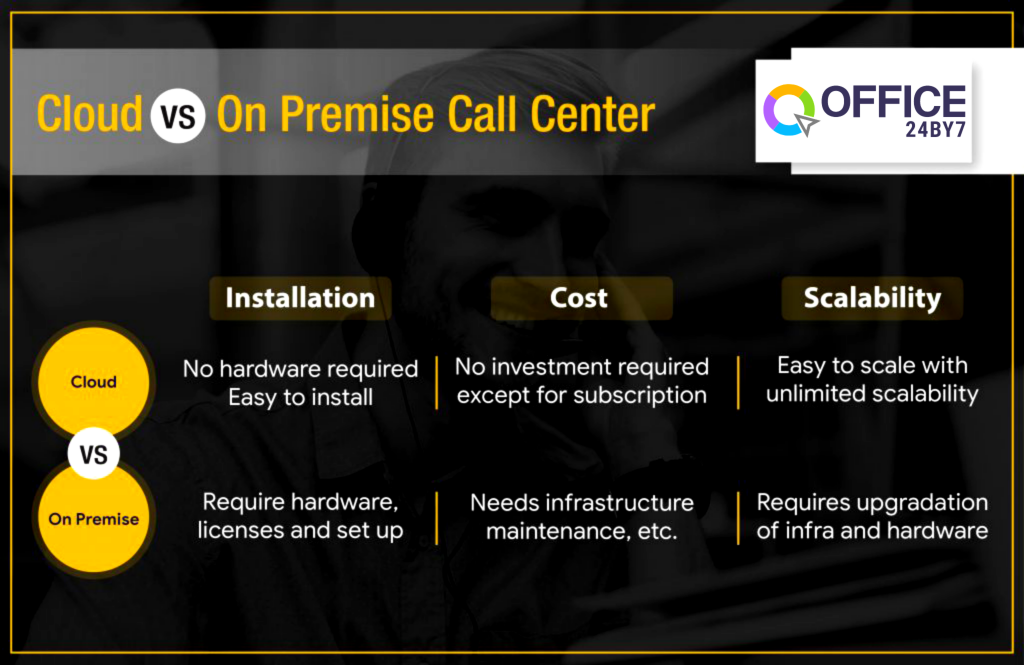
The emergence of cloud-based communication technologies changed the way business interaction takes place. In times of high competition everywhere, it became necessary for businesses to adopt the technologies to deliver unmatched customer experience. Of course, the technologies ensured the easy management of services with higher accuracy and greater productivity. This brings us to a crucial debate about on-premises vs. cloud call center.
A call center can be set up in two ways using cloud communication technologies.
- Cloud-based call center
- On-premises call center
Cloud-based Call Center
Cloud call center software are network-based communication service models where the provider owns and operates the call center technology and offers the services remotely on a subscription model. This is a revolutionary innovation, as most businesses lack expertise in running call centers. Cloud-based call center improves interaction and enhances customer satisfaction for sure.
On-premises Call Center
On-premises call center uses cloud communications technologies, but all the software and hardware required to run a call center are placed on the customer’s premises or property. Operations and maintenance are the customer’s responsibility. As you can see, setting up such an infra requires some investment, but once invested, it lasts forever except for occasional upgrades.
Both have their own advantages when it comes to running the call center successfully. However, one trend globally stands out when it comes to these two types of contact centers: many big companies are increasingly swapping the on-premise contact centers for cloud-based call centers for their operational flexibility and efficient call handling.
Let’s compare the on-premise vs. cloud call center in detail:
1. Installation
Cloud-based:
Well, starting a cloud-based call center can’t get any easier. All you have to do is subscribe to a provider’s services.
Office24by7 is one of the leading call center service providers in india. You can subscribe to their services form here.
On-Premise:
As is the case with starting something new, it requires a lot of planning and procuring the required hardware, premises licenses, etc. It takes time and requires an investment.
2. Operational and Maintenance Costs
Cloud-based:
It doesn’t require hardware or setup costs except for subscription, so it costs far less. But, of course, it needs robust internet connectivity for the smooth running of the operations. Well, internet charges are too small compared to the server price. The due renewals of subscriptions are the only maintenance charges for cloud-based call centers.
On-Premise:
As discussed earlier, it requires purchasing many things, including servers, systems, and equipment. Not to forget the licensing fees. Setting all of these takes effort and people. Of course, the premises themselves need decent investment as central business districts have a serious space crunch and demand big spending in advances and rents, etc.
3. Maintenance
Cloud-Based:
It doesn’t require any maintenance as you don’t have any call center infrastructure at your end. Maintenance and all fall under the service provider’s responsibility. As you can see, when the hardware maintenance is removed, there are no significant charges.
On-Premise:
Hardware requires maintenance, the software requires upgradation, and all of that regularly. Even systems require maintenance. Not to tell about the premise maintenance. So, on-premises call centers do need a good maintenance budget.
4. Flexibility
Cloud-Based:
Cloud-based call centers offer a lot of flexibility and maneuverability regarding operations. You can add or delete a user easily with credentials to log in over a few clicks, Likewise, you can end the subscription as and when needed.
Apart from that, it offers remote accessibility, where the agents can be available from anywhere.
On-Premise:
Lack of flexibility is one of the main stumbling blocks in the on-premises call center software in India. No scope for customization is the other one. If you have to add additional users, you must upgrade the systems.
As per the maneuverability, it doesn’t offer any remote accessibility. To ensure 24*7 support, you need people at the call center only.
5. Scalability
Cloud-Based:
Like everything else, a cloud-based call center provides easy scalability, that is, unlimited scalability. Most service providers offer unlimited scalability as they use servers on a rotation basis. You can scale as much as you want with additional user subscription fees. Hence, not only the scalability, scalability at affordable costs is the advantage.
On-Premise:
Scalability is possible but comes with huge costs. To scale the services, you must upgrade the server and other infrastructure. So, it’s like setting up the call center all over again, incurring a huge cost.
Conclusion
Cloud-based and on-premises call centers both have their own advantages and disadvantages. A business must analyze its specific needs to choose an on-premise vs. cloud call center. The benefits of cloud over on-premise call centers are various. A cloud-based call center may be a good option if a business is looking for a call center that is easy to set up and maintain. If a business needs more flexibility and control over its call center, then an on-premises call center may be better.
Office24by7’s automation software tool is a top cloud based commnication solutions. Whether you’re looking to optimize internal workflows or improve customer engagement, Office24by7 delivers a robust and scalable solution that meets the demands of modern business communication.

